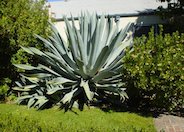
Common name:Century Plant, Maguey
Botanical name:Agave americana
This plant is fast growing to about 6'-10' tall and 8'-13' wide. Wide gray leaves have stiff terminal spines and recurved teeth on margins. It prefers full sun and well-drained situations. After blooming, which could take several years, it will die but will send up new pups from around the base. Some people are allergic to the sap. Removal is difficult if unwanted.
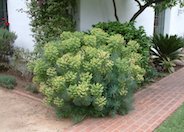
Common name:Bush or Dome Euphorbia
Botanical name:Euphorbia characias
This perennial will reach about 4' tall and has blue green leaves with bright green flowers that bloom from late winter to early spring.
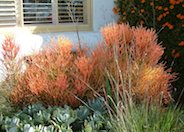
Common name:Sticks on Fire Pencil Tree
Botanical name:Euphorbia tirucalli 'Sticks on Fire'
In frost free areas, Euphorbia can become a 30' tree but in colder areas, it is often knocked back by frost. It can be single or multiple trunked. It has green cylindrical branches that are about the diameter of a pencil. Leaves are not usually present. Some people are allergic to the sap. It is tolerant of salt, full sun, part shade and quite drought resistant. It is a great accent plant for a container. This form has yellow or orange branches if in full sun.
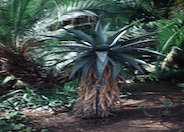
Common name:Mountain Aloe
Botanical name:Aloe marlothii
This upright species of Aloe will reach 10' tall by about 6' wide. This Aloe flowers from red to gold during spring and summer. The leaves of this plant are very fleshy, and have reddish-brown spines along the margins and randomly on the leaf.
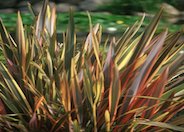
Common name:Rainbow Warrior New Zealand Flax
Botanical name:Phormium 'Rainbow Warrior'
New Zealand Flax is an excellent accent plant for the garden. Evergreen leaves are long, narrow, and grow upright. Clusters of flowers grow on spikes above the foliage in late spring and summer. 'Rainbow Warrier' grows 3'-4' tall, 5'-6' wide. Leaves are darker salmon, turning cream as they age. Foliage turns deep red in winter.
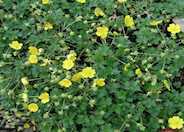
Common name:Ground Cover Potentilla
Botanical name:Potentilla neumanniana
This plant is a perennial and a persistant groundcover. Dainty looking yet tough, it grow up to 3"-6" high. Bright green leaves are divided into five leaflets. Butter yellow, 1/4" flowers bloom in spring and summer. This groundcover spreads quickly and is a good bulb cover.
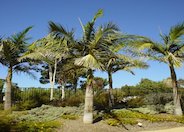
Common name:King Palm
Botanical name:Archontophoenix cunninghamiana
This is a beautiful palm which grows 40' or higher with a 10'-15' spread. The feathery leaves can grow 10' in length and are green above and gray beneath. It tolerates shade and can grow beneath tall trees for a long time if needed. It 's unique because it can be used as an indoor plant and will tolerate temperatures down to 28 degrees F.

Common name:Cape or Monarch Daisy
Botanical name:Arctotis fastuosa alba
Vendium fatuosum is an annual. It produces orange flowers that have multi-petals and a large dark center.
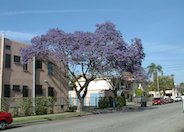
Common name:Jacaranda
Botanical name:Jacaranda mimosifolia
This irregular to rounded deciduous tree will reach about 40' tall and has fine, compound green leaves with blue flowers. Jacaranda's main blooming season is in spring and summer, but it will often produce sporadic blooms in fall as well.
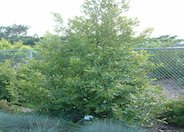
Common name:Dwarf Carolina Laurel Cherry
Botanical name:Prunus caroliniana 'Compacta'
This large evergreen shrub or small tree has leaves that are glossy and 2"-4" in length. It is excellent as a formal hedge or an informal screen. It has creamy white flowers in late winter and spring followed by small black berries. 'Compacta' reaches 8'-10' tall and 6'-8' wide and tends to be more dense.
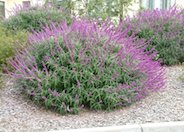
Common name:Mexican Bush Sage, Velvet Sage
Botanical name:Salvia leucantha
The Mexican Sage is a bushy shrub that grows 3'-4' tall and wide. It has hairy white stems, gray green leaves and velvet-like purple flower spikes that bloom summer through fall. This shrub tolerates sun, light shade, little water, and is hardy to 15 degrees F. The Mexican Sage is drought tolerant and attracts hummingbirds. -Cornflower Farms
| Designer: Stephanie Blanc | Hacienda Garden 1 |
Photographer: GardenSoft |
Soils and Compost:
Practice grass-cycling by leaving short grass clippings on lawns after mowing, so that nutrients and organic matter are returned to the soil.
Water Saving Tip:
Be sure to fix all leaks promptly no matter how small they may seem.
Integrated Pest Management:
Remove irrigation water and fertilizer from areas where you don't want weeds to grow.
